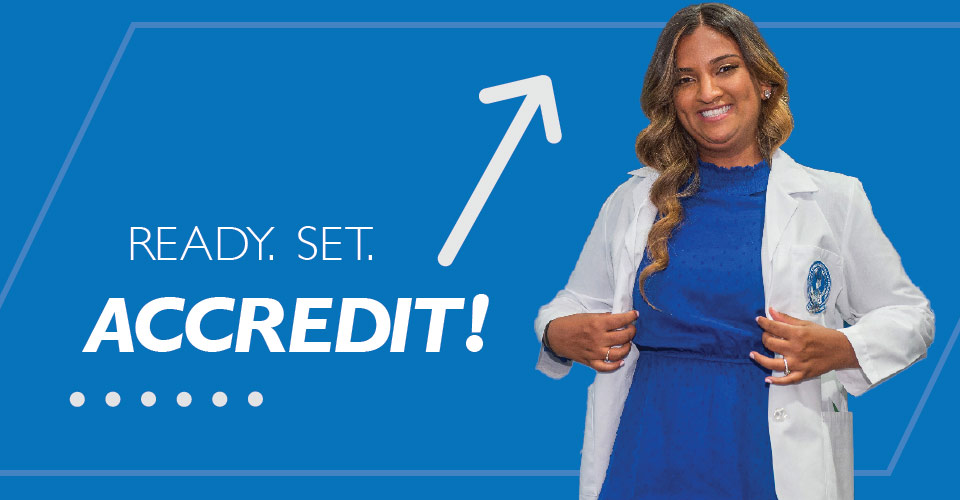Not so long ago, NEOMED’s campus community rallied together to assure the continued accreditation of the College of Medicine — a process that was highly successful. Now, preparations are underway for Higher Learning Commission (HLC) accreditation — a comprehensive evaluation of the entire University, comprising all three Colleges.
NEOMED was last visited by the HLC for comprehensive evaluation in 2013. Since then, the University has voluntarily participated in HLC’s Open Pathway 10-Year Cycle, which allows NEOMED to regularly and innovatively address institutional goals, while also reaffirming its mission as an institution focused on student success and quality education. The process and NEOMED’s progress can be seen on the University’s new HLC 2022 Site Visit webpage.
Institutional accreditation every 10 years by the Higher Learning Commission is required by the U.S. Department of Education. The stakes are high: The very ability of students to receive federal financial aid is tied to this accreditation.
And preparing for this scrutiny is a big lift. Institution-wide, more than 70 people are working on a process overseen by university leaders including Richard Kasmer, Pharm.D., J.D., vice president for academic affairs; Deborah Loyet, M.S., M.A., executive director of institutional research, who serves as NEOMED’s HLC Accreditation Liaison Officer (ALO); and Jeff Wenstrup, Ph.D., chair of NEOMED’s HLC Steering Committee. To conduct a self-study for compliance with accreditation criteria, teams appointed by President Langell are now producing a narrative (officially known as the Assurance Argument) complete with proof points (known as the Evidence File) to demonstrate that the University operates high-quality educational programs and has appropriate continuous quality improvement processes in place for its programs and operations.
The process will culminate in a site visit by the HLC in September. At that time, the University must demonstrate to an external team of HLC Peer Reviewers that it meets the HLC’s five Criteria for Accreditation.
A closer look
Here’s a little more in-depth look at the HLC accreditation process.
Last fall, teams of employees and student trustee Joshua Tidd began research for the 2021 HLC Assurance Argument and Evidence File. One team is assigned to each of the five HLC criteria and is writing that section of the Assurance Argument, updating an interim narrative Argument submitted and approved in 2017. A sixth team is working to complete the Federal Compliance Filing, a separate report by the University that demonstrates compliance with several federal regulations for higher education institutions.
Each team, with its own points to prove, has examined and documented changes — for example, several degree programs that have been added in the College of Graduate Studies in recent years, or University health care partner affiliations that have shifted over time — as well as evolutions at the University in the last decade, including the inauguration of a new president. Together, the teams have written a narrative aiming to show how the University has upheld the HLC’s five criteria over the last four years since the 2017 Assurance Review.
In mid-February, the teams will complete a first draft of the Assurance Argument, and NEOMED’s HLC Steering Committee will then scrutinize it as if they were external readers. “We’ll look at whether we have any gaps in compliance,” explains Loyet. “For example, is the University missing a written policy? That’s something we might be able to remedy before September.”
Going through this process benefits the University, says Loyet.
“HLC accreditation is not just something the University ‘has to do,’” she explains. “Accreditation ensures that we offer high-quality programs and that our students are getting the exceptional experience that they are paying for.”
NEOMED is starting this process from a position of strength, notes Loyet, since its last evaluation in 2013 placed it in good standing on what’s called an open pathway.
“The effort and quality of the work being done by teams across the University to prepare our Assurance Argument has been nothing short of heroic,” says Dr. Kasmer. “I am most appreciative of the way everyone has stepped up to contribute to this important undertaking, and our students deserve nothing less.”
